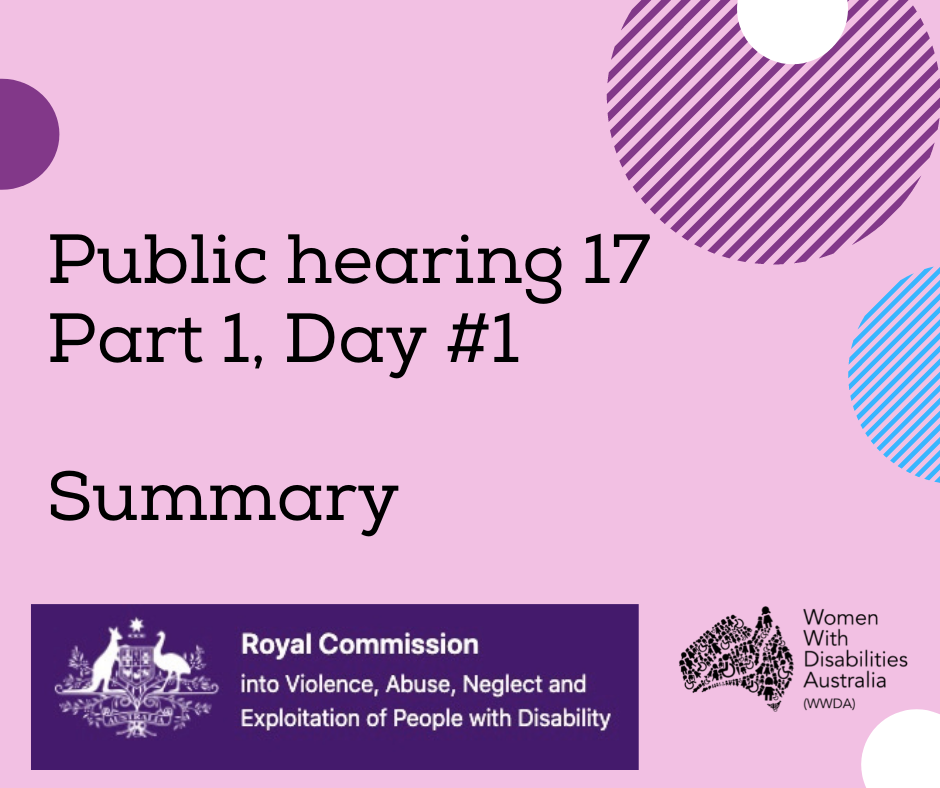Content Note – post discusses violence against people with disability
.
.
.
Summary of Day 1 for Disability Royal Commission public hearing 17 (online).
Public hearing 17 (Part 1 – online): ‘The experience of women and girls with disability with a particular focus on family, domestic and sexual violence’ is focusing on the experience of women and girls, feminine-identifying and non-binary people with disability with a particular focus on family, domestic and sexual violence.
The first day of the hearing was held today and was live streamed to the public.
Witnesses giving evidence were:
- Jen Hargrave (Senior Policy Officer Women with Disabilities Victoria)
- Associate Professor Patsie Frawley (Associate Professor Disability and Inclusion Studies, University of Waikato)
- Thelma Schwartz (Principal Legal Officer, Queensland Indigenous Family Violence Legal Service)
- Maria Woods (District Manager Integrated Prevention and Response to Violence Abuse and Neglect (PARVAN) New South Wales Health)
- Cathy Want (Manager, Rosies Place)
- Kathryn Fordyce (CEO, Laurel House Tasmania)
- Dr Jacoba Brasch QC (President, Law Council of Australia).
Important topics and issues were discussed including:
- Acknowledging that the rates of family/domestic and sexual violence for women and girls with disability are much higher than women without disability.
- Most sexual abuse is perpetrated by a male relative, in-law, family friend, acquaintance or neighbour and in most cases the abuse occurs more than once.
- Some women have acquired disability, especially psychosocial disability as a result of violence.
- Carers of women with disability can also use violence which may not be easily recognised or reported.
- Inaccessibility of emergency refuges for victims of family and domestic violence who have children with disability.
- Women with disability in segregated settings and group homes also experience violence from relationships and people inside and outside of their home.
- Women with disability experience extra challenges when reporting violence or seeking support due to social isolation, geographical isolation, lack of proper police responses, not being believed, being slut-shamed and services not being culturally safe for First Nations, refugee, migrant or culturally and linguistically diverse women.
- The importance of intersectionality and how it compounds inequality and discrimination.
- Sometimes when women report to police they experience misidentification as the perpetrator due to communication challenges and interviewing styles not accommodating for specific needs of women with disability. First Nations women with disability are more likely to experience this.
- The need for more inclusive and tailored sexuality and relationship education in schools, including resources in Easy English and accessible formats for children and young people with disability.
- The need for service providers to collaborate when providing supports or programs in the prevention of violence against women with disability.
- The need for a National definition of domestic and family violence in the law to make legal responses and protections uniform across all states of Australia.
Day 2 of the hearing will commence tomorrow at 9:45 am with WWDA CEO Carolyn Frohmader and Dr Linda Steele giving evidence.
You can find out more and watch the live stream on those days here: https://disability.royalcommission.gov.au/
We also live tweeted during the hearing and you can find more details of the evidence on our WWDA Twitter page here: https://twitter.com/WWDA_AU
If any of the content of the hearing raises concerns for you please call Blue Knot Counselling and Referral Service: 1800 421 468
If you are experiencing sexual violence, and domestic and family violence and need support please contact: 1800Respect on 1800 737 732

